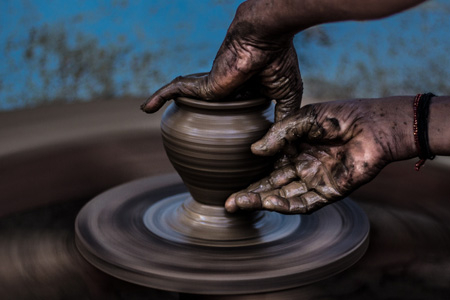Some Sadducees – those who say that there is no resurrection – approached Jesus and put this question to him. ‘Master, we have it from Moses in writing, that if a man’s married brother dies childless, the man must marry the widow to raise up children for his brother. Well, then, there were seven brothers. The first, having married a wife, died childless. The second and then the third married the widow. And the same with all seven, they died leaving no children. Finally the woman herself died. Now, at the resurrection, to which of them will she be wife since she had been married to all seven?’
Jesus replied, ‘The children of this world take wives and husbands, but those who are judged worthy of a place in the other world and in the resurrection of the dead do not marry because they can no longer die, for they are the same as the angels, and being children of the resurrection they are sons of God. And Moses himself implies that the dead rise again, in the passage about the bush where he calls the Lord, the God of Abraham, the God of Isaac and the God of Jacob. Now he is God, not of the dead, but of the living; for to him all men are in fact alive.’ (Luke 20:27-38)
Reflection - A work in progress
In this episode from Luke’s Gospel, it is the Sadducees, rather than the Pharisees, who confront Jesus. Like the Pharisees, the Sadducees were a Jewish sect. They rejected much of what the Pharisees believed in, including the possibility of life after death.
The rather ridiculous scenario they put to Jesus in today’s Gospel was meant to show how ridiculous belief in resurrection was.
Part of the flaw in their scenario was the assumption that life after death would be the same as life is now, with the same conditions applying. So, they based their scenario on marriage in this world in order to ask the question about whose wife the woman would be in the next.
Without ridiculing their beliefs, Jesus says that in the risen life we are dealing with a totally new situation, one not governed by the laws of this life.
Then Jesus also uses a quote from Moses to show that Moses himself implies that the dead rise again.
Jesus’ proclamation of the ‘God of the living’ gives us the right context for viewing eternal life. Not as separate to, but as a continuation of the relationship with God we already live here. This also helps make sense of the Kingdom or Reign of God as already being present among us – not just as something yet to come.
God’s life in us is a work in progress. The disciples of Jesus live the life of the Kingdom now to the extent that they share in the life of God and can enable that reign of God’s grace to be experienced by others through the good deeds they do.
Eternal life is not something yet to come, but something we have already begun to live here and now.
Download to read or print our Celebrating At Home prayers, reading and reflection for this Sunday:
Celebrating At Home 32nd Sunday in Ordinary Time [PDF]
Celebrating At Home 32nd Sunday in Ordinary Time [ePub]















